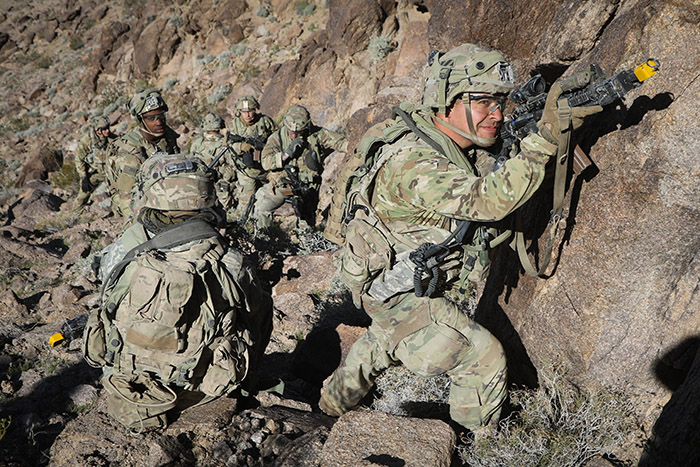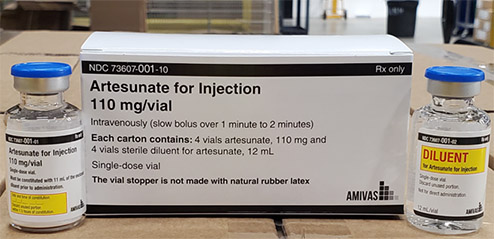USAMMDA partners to protect against severe malaria

In March, the U.S. Army Medical Materiel Development Activity, along with its industry partner Amivas LLC, announced the U.S. release of Artesunate for Injection, a drug solution used in the initial treatment of severe malaria in adult and pediatric patients. In May 2020, the medication received marketing approval from the U.S. Food and Drug Administration for the U.S. commercial market. Transmitted to humans via the bite of mosquitos, the Plasmodium parasite that causes malaria can lead to severe cases when the infection becomes complicated by serious organ failure or abnormalities in the patient's blood or metabolism.
Ryan Adams serves as product manager for the Malaria Treatment Drug-Intravenous Artesunate (MTD-IVAS) program, within USAMMDA's Warfighter Protection and Acute Care Project Management Office. The MTD-IVAS team, led by Army Maj. Victor Zottig at that time, developed the acquisition strategy that resulted in the FDA approval of Artesunate for Injection. Although the treatment has been targeted for military use among deployed troops in tropical and subtropical regions, the drug will be available for the civilian population as well.
"Malaria is one of the most significant infectious disease threats to our Service Members deployed overseas, and it can certainly affect operational readiness," said Adams. "Since 2016, we've been working with our industry partner Amivas to develop the Intravenous Artesunate solution, and we're very thankful for the success we've seen in such a short amount of time – our Warfighters need to have this protection."
While the team's primary focus has been placed on U.S. Service Members overseas, malaria remains a viable threat throughout the U.S. as well. According to the Centers for Disease Control and Prevention, malaria remains a cause of considerable morbidity and mortality for U.S. residents who contract the disease. CDC surveillance of malaria continues to show a gradual increase within the U.S., with approximately 300 cases of severe malaria annually.
Adams provided a brief history of the availability of antimalarial drugs, and he explained that since 1991, intravenous quinidine was the sole non-orally administered antimalarial available in the U.S. However, this drug was discontinued by its supplier for manufacture and distribution in the U.S. in March 2019, leading to greater urgency for an effective replacement. Adams pointed out that proper treatment of severe malaria relies upon the initial use of intravenous drugs to quickly decrease the amount of malaria parasites in the blood, to allow a patient to recover sufficiently enough to begin taking oral treatment drugs.
"Since 2004, the Walter Reed Army Institute of Research had been developing a novel current Good Manufacturing Practices formulation of MTD-IVAS, and in 2007, domestically manufactured cGMP MTD-IVAS from WRAIR was first made available to physicians and hospitals in the U.S., through the CDC's Investigational New Drug protocol for compassionate use treatment of patients with severe malaria," Adams explained. "In 2009, the cGMP manufacture of MTD-IVAS was transferred from WRAIR to USAMMDA's Warfighter Protection and Acute Care product manager, and our group has managed it ever since."

"The U.S. Army selected MTD-IVAS for development and FDA approval based on the recognition that it is the most effective antimalarial drug for the treatment of severe malaria, with an excellent safety profile," he continued. "The World Health Organization recommends the use of MTD-IVAS in adults with severe malaria until they can tolerate oral medications. In the absence of MTD-IVAS, the WHO recommends the use of artemether or quinine. Large clinical trials have demonstrated that MTD-IVAS has approximately 35 percent better efficacy over intravenous quinine. However, quinine and artemether are not FDA approved, and with the discontinued availability of IV quinidine, MTD-IVAS is the only FDA-approved drug in the U.S. for treatment of severe malaria."
Adams confirmed that, to date, more than 500 civilians with severe malaria in the U.S. have been treated successfully with MTD-IVAS under the CDC protocol.
While the Artesunate for Injection drug solution is now commercially available in the U.S., the work of Adams and his team will not stop. He will continue in his role as the MTD-IVAS product manager for USAMMDA's WPAC PMO, which means he will remain as life cycle manager for the product, serving as the single point of accountability for all related product development objectives.
"The MTD-IVAS product manager [currently Adams] will retain responsibility for product support management for several years after this FDA approval, and the IVAS Integrated Product Team will continue to include appropriate members and stakeholders to ensure availability of the product," he said.
Adams is very proud of the work done by all of those involved to develop and release the Artesunate for Injection drug product, and he looks forward to its success in helping to protect both our military and civilian citizens for years to come.
"Artesunate for Injection fulfills a critical gap because it is the only FDA-approved drug to treat severe malaria in Service Members and the U.S. population," he said. "It's a remarkable achievement for the U.S. Army and its long-standing history of developing drug products that meet the goal of FDA approval and provide the capability to the Warfighter. This great accomplishment is a testament to the dedication and perseverance of both the Army and our industry partner."
USAMMDA is a subordinate command of the U.S. Army Medical Research and Development Command, under the Army Futures Command. As the premier developer of world-class military medical capabilities, USAMMDA is responsible for developing and delivering critical products designed to protect and preserve the lives of Warfighters across the globe. USAMRDC is leading research to prevent, detect and treat COVID-19. USAMMDA is applying existing field-leading research capabilities, a global research network and established partnerships to support the Whole-of-Government response to COVID-19.













